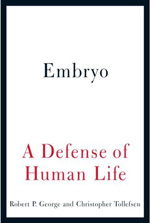

 Book Review by Justin D. Barnard - Director of the Institute for Intellectual Discipleship
Book Review by Justin D. Barnard - Director of the Institute for Intellectual Discipleship
Posted: March 91, 2008
Embryo: A Defense of Human Life
Robert P. George and Christopher Tollefsen
Details: Doubleday, Jan. 8, 2008, ISBN: 0385522827
 Get It At |
The 20th century British essayist and “apostle of common sense” Gilbert Keith Chesterton has been quoted as saying, “A society is in decay when common sense has become uncommon.” For some, “decay” – as a term employed to describe current societal conditions – is grossly understated. For, we are living in an era in which the very idea of common sense has not merely become uncommon, but virtually unimaginable.
Consider, for example, the following line of reasoning. Since I am now a human being, it follows that I have been a human being at every stage of my existence. This means, among other things, that I was a human being yesterday, last year, five years ago, during adolescence, and during childhood. By the same reasoning, I was also a human being when I was an embryo, i.e., at the earliest stage of my existence.
For those who identify with Chesterton’s legacy, the foregoing inferences are unremarkable, yet undeniable instances of common sense. For today’s intelligentsia, however, matters of reasoning about human life are much more complex – requiring a measure of academic sophistication that only trained philosophers, scientists, or theologians can fully appreciate.
In the dialectic surrounding issues of life (e.g., abortion, embryonic stem cell research), those whose moral sensibilities have been forged in the fires of the cultura thanatos prefer more subtle distinctions. Consequently, the rhetorical landscape becomes cluttered with all manner of language to distinguish between human beings and persons as a means of justifying the killing of the former in the self-interests of the latter.
Into this argumentative morass comes the rigorous, lucid common sense of Robert P. George (Professor of Jurisprudence and director of the James Madison Program in American Ideals at Princeton University) and Christopher Tollefsen (Philosophy Professor at the University of South Carolina) in their new book, Embryo: A Defense of Human Life. Embryo is as refreshing as a crisp, cool northerly fall breeze sweeping away the last vestiges of summer heat on a late September southern evening.
The book’s thesis is as clear and compelling as the arguments that sustain it: “embryonic human beings deserve full moral respect.” In defending this claim, George and Tollefsen take aim at four ways in which those who deny it attempt to avoid this conclusion. First, some attempt to deny that a human embryo is, in fact, a human being. Second, others deny that human embryos are persons – only the latter deserving of full moral respect. Third, some embrace what George and Tollefsen call “moral dualism” according to which human beings are not deserving of respect by virtue of what they are, but by virtue of certain qualities possessed. Finally, still others argue that showing full moral respect for human embryos is consistent with their intentional destruction.
In arguing against the first claim (i.e., that human embryos are not, in fact, human beings), George and Tollefsen appeal primarily to evidence from embryology (chapter two). They point that from fertilization a human embryo is distinct, characteristically human in its genetic makeup, and “complete, or whole.” Thus, it “is fully programmed and has the active disposition to use that information to develop himself or herself to the mature stage of a human being, and, unless prevented by disease or violence, will actually do so” (pg. 50). The scientific evidence in this chapter is so striking that it strains the imagination to think that someone could conclude anything other than the obvious: a human embryo, from fertilization, is a human being. But those with either a vested interest in harvesting human embryos for spare parts (i.e., stem cells) or a penchant for maximizing the autonomy of the self (as in the case of abortion on demand) appeal to more subtle distinctions: namely, that between human beings and persons.
George and Tollefsen take on this view in chapter three. In a comprehensive survey, George and Tollefsen make their case against various kinds of anthropological (or ontological) dualisms – views according to which there is a distinction between our natures as embodied creatures and our natures as persons. As evidence of the book’s currency, not to mention the authors’ philosophical acumen, this chapter includes a helpful treatment of philosopher Lynn Rudder Baker’s theory of human personhood known as “constitutionalism.” Ultimately, George and Tollefsen argue for a view of human beings they call (following recent philosophical literature) “animalism.” To be a human being is to be a human animal. Thus, they conclude, “if we are by our nature human animals, and human animals live personal lives, then we are, all of us, persons. But if persons, were we not entitled to moral respect right from the start of our existence?” (pg. 82).
At this point in the argument, the rhetorical conclusion suggested by the previous quotation seems inescapable. Still, some might accept that persons are entitled to moral respect right from the start of their existence while arguing that personhood is not inextricably linked with our nature as human beings. Rather, it is something conferred or perhaps even earned on the basis of particular capacities. Thus, not all human beings are, by nature, persons since human personhood is rooted in a set of non-essential capacities that some human animals possess and others, at various stages of development, do not. George and Tollefsen call this view “moral dualism.” And after a brief excursus in moral philosophy (chapter four), they argue against moral dualism in chapter five.
After considering several important objections to their view (chapters six and seven), including, for example, the problem of monozygotic twinning, George and Tollefsen consider arguments by those who maintain that even if human embryos deserve full moral respect, their destruction is worth the cost as “collateral damage” in an effort to achieve an overarching and outweighing good. The book concludes with a chapter that discusses the political and cultural implications of their position and boldly offers practical guidelines for public policy in issues involving human life (e.g., embryonic stem cell research).
Given the audacity of their commonsense thesis (if it’s human, it must be human!), it is no small wonder that some will look for all sorts of grounds on which to object. For example, in a recent New York Times review of Embryo, William Saletan argues that the sharp boundaries that George and Tollefsen attempt to draw around the human embryo as a distinct organic whole runs afoul of the purportedly scientific view that there really are no lines in the biological “network” of “the entire Internet of evolving species.” “The embryo, too, is collective,” Saletan opines.
With patience and charity, George and Tollefsen have pointed out in their response to Saletan that the mere fact of “biological complexity” (i.e., that organisms are constituted by parts and are, themselves, parts of larger systems) does not entail the impossibility of organismal individuality. Yet, in a subsequent reply, Saletan seemed unmoved, insisting that an “embryo defies such neat categories.” “It’s a part, a whole, and a dyad,” Saletan writes.
Saletan’s denial of lines in the biological kingdom, as a way of avoiding the implications of the argument presented in Embryo, is decisively refuted in a final response by George and Tollefsen. The latter point out that the very relationship upon which systems depend in order to be so described (i.e., to be described as “systems” or “networks”) presuppose the individuation of the whole entities of which the systems are comprised.
The exchanges between the authors of Embryo and Saletan are indicative of the force of the book’s argument. George and Tollefsen have made a compelling case for the claim that from the earliest stages of their development, human embryos are human beings – thus, deserving of full moral respect. In fact, the argument is perhaps so decisive that the only way to avoid its logic is to deny that there are any real distinctions whatsoever – a possibility with which Saletan apparently flirts.
If Chesterton is right, then Saletan’s flirtation with such an absurdity is an index of our societal decay. One can only hope that Embryo will restore some common sense in an arena of the public square where it has become so very uncommon.
The Carl F.H. Henry Institute for Intellectual Discipleship at Union University
Director: Justin Barnard
1050 Union University Drive, Box 1849, Jackson, TN 38305
phone: 731-661-5963 | e-mail: jbarnard@uu.edu